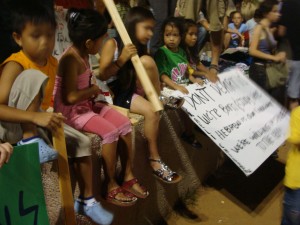 The Huffington Post, August 3, 2010
The Huffington Post, August 3, 2010
Maan News Agency, August 4, 2010
After a year-long battle over the fate of 1200 children of undocumented migrant workers, the Israeli cabinet has finalized plans that will lead to the deportation of at least 400 minors, along with their parents.
The government also approved criteria that would make approximately 800 of the children eligible for naturalization.
Children must have studied last year in the state school system, they must be registered for first grade or higher, they must have been here for at least 5 consecutive years, they must have been born here or arrived before the age of 13, they must speak fluent Hebrew, and their parents must have arrived on a valid work visa.
Families who are eligible to stay in Israel have 21 days to file their paperwork. Critics say that this window is too narrow and is likely to lead to the deportation of hundreds of kids who are eligible for naturalization but fall through the bureaucratic cracks.
Critics have also pointed out that the strict criteria might lead to the deportation of minors who meet all conditions except for one—such as a child who is repeating kindergarten and is not registered for first grade; the children of parents who worked for embassies; or families who left the country for a short period in the last five years. Also of concern are the now-adult children of migrant workers. A generation born and raised in Israel, this group is ineligible for naturalization simply because they are over the age of 18.
Interior Minister Eli Yishai, who has been a vociferous proponent of the deportation, will examine the borderline cases.
The struggle began last July, when Israel announced its intention to expel all 1200 children of undocumented migrant workers. The move, a reversal of Israel’s long-held policy against deporting minors, sparked outrage amongst Jewish Israelis and massive protests.
Responding to public pressure, the deportation was delayed until the end of the school year. In the meantime, Israel, which has no immigration law for non-Jews, formed a governmental committee to find a “one-time” solution to the matter.
Those who support the children argue that the kids are Israeli. They were born and raised here, speak Hebrew, attend local schools, and are a part of society.
Yishai, who has backed the plan for deportation despite the fact that the public and many Israeli politicians are against it, says the children are a threat to the Jewish character of the state. He has also stated that migrant workers bring “a profusion of diseases” to Israel.
On Sunday, Prime Minister Benjamin Netanyahu—who has also expressed concern that the children of foreign workers might erode the Jewish identity of Israel—praised the cabinet’s decision to naturalize 800 minors while deporting the rest, calling it “reasonable and balanced.”
Roei Lachmanovich, Yishai’s spokesman, remarked on Sunday that the move is not a decision against the children. Rather, it is against the parents who, according to Lachmanovich, are illegal workers that hide behind their babies.
But many of the women lost their legal status after they gave birth as Israeli policy forbids migrant workers from having children in the state—effectively forcing women to choose between keeping their baby or their visa.
Israeli policy also forbids migrant workers from getting married.
Migrant workers arrived in Israel in the late 1980s, at the beginning of the first Intifada, to replace Palestinian day laborers. Their population grew steadily throughout the 1990s and boomed in the early 2000s, with the second Intifada.
The last major crackdown on undocumented migrant workers began in 2002. Immigration police targeted fathers in hopes that their wives would follow them back to their country of origin, taking their children along with them. Instead, many women chose to stay in Israel and a community of single moms took root.
Today, Israel is home to approximately 300,000 migrant workers. Estimates of the number of undocumented workers vary, with some placing it as high as 250,000.
The Israeli government says that it aims to reduce the state’s dependency on migrant workers. The government also hopes to clear the country of undocumented laborers. But critics point out that in 2009, the same year the plans to expel the children were announced, Israel issued a record number of visas to migrant workers. Critics refer to Israel’s simultaneous deportation and importation of workers as the “revolving door” policy.
In the wake of Israel’s decision to expel children and their families, the United Nation’s Children Fund (UNICEF) issued sharp criticism of the revolving door. Regarding the deportation UNICEF remarked, “The government’s policy is a gross violation of the Convention on the Rights of the Child,” pointing out that Israel is a signatory.
Human rights groups and Israeli politicians also slammed the decision. Haim Oron, head of the left-leaning Meretz party, called the deportation “brutal, random, and regretful.”
In an op-ed penned for the Israeli daily Haaretz, Yossi Sarid, a former member of Knesset, questioned whether Zionism and humanitarianism can co-exist. Bemoaning the expulsion, calling it “despicable” and “evil”, Sarid wrote, “The fools in the cabinet decided to let 800 children of migrant workers remain in the country—but took the opportunity to deport 400.”
Sarid called on the Israeli public to hide the children in their homes, “Let the representatives of the law look for them in the attic, in the basement, in the closets, under the beds; let the authorities tear them from your arms.”
Photo: Mya Guarnieri. Children of undocumented migrant workers at a recent protest against the deportation.